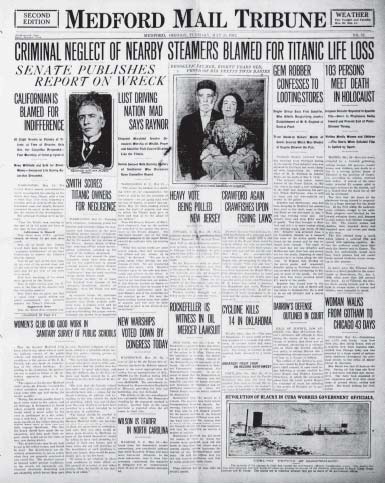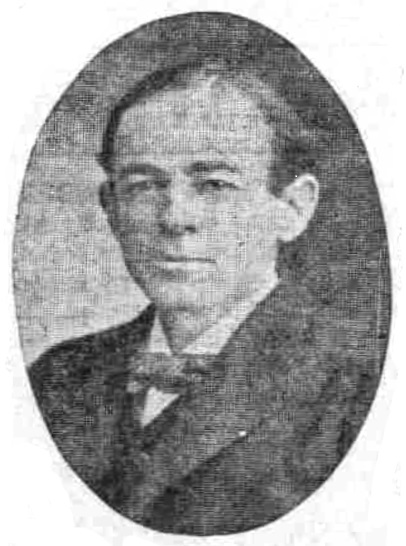For over a hundred years, the Medford Mail Tribune argued against what it perceived to be dangerous, irrational, or unfair—if often popular—political measures, facing libel suits, jailings, death threats, and boycotts as a result. The Mail Tribune was created through a 1909 merger of the Medford Mail, a proponent of political reform first published in 1888, and the Medford Daily Tribune, which began publication in 1906. The paper earned recognition and respect from journalists for its public service and was the first Oregon newspaper to win a Pulitzer Prize (1934).
George Putnam, a progressive Democrat and the news editor at the Oregon Journal before moving to Medford in 1907, was the Medford Mail Tribune’s first owner and editor. Among his early editorial campaigns was an effort to improve the city’s drinking water, which he described as "so muddy that it is clogging the meters.” Putnam suggested that the city was "obtaining money under false pretenses" by selling polluted water to residents, and published his own eyewitness account of the president of the local railroad company chasing the mayor down Main Street with an ax. "The paper that has no enemies has no friends," Putnam wrote of his ordeal. He not only was jailed, convicted, and fined, he reported, but also was “slugged on the streets and denied justice by two grand juries.” The Oregon Supreme Court later reversed the verdict.
Putnam sold the Tribune to Robert Ruhl and S. Sumpter Smith in 1919. Ruhl, as the new editor, proclaimed the paper an independent force for better government in the Rogue River Valley. In the early 1920s, the Mail Tribune editorialized strongly against the increasing influence of the Ku Klux Klan in the state, making it one of the few Oregon newspapers to take a stand against the Klan. Facing a boycott of the newspaper by advertisers and Klan supporters, Ruhl hoped that in a "time not far distant, the widespread report that Jackson County is a hot bed of Ku Kluxism, can be finally and permanently denied."
During 1932–1933, in the depth of the Depression, the Mail Tribune survived another boycott and threatened violence by supporters of a local populist insurgency called the Good Government Congress. Led by the demagogic owner and editor of a competing daily, the Medford News, the Good Government Congress episode roiled southern Oregon politics and society. Its violent end in early 1933 brought national attention to the region as well as a Pulitzer Prize to the Mail Tribune for its "leadership in pleading for straight-thinking and peace."
Eric W. Allen Jr. took over the editorial reins of the paper in 1964 and soon gained a reputation as a supporter of civil rights, handgun control, land use planning, controls on air and water pollution, and other issues that were unpopular with many Mail Tribune subscribers. Under Allen’s leadership, the newspaper supported progressive candidates for state and national offices, regardless of which party they represented. "It's never pleasant to be damned, and I was," Allen wrote, adding, "I'm a good forgetter, too." He was a fervent believer in the First Amendment. "Cherish it as you would your lives,” he wrote, “for without the First Amendment, your lives would almost assuredly be hardly worth living."
Robert Ruhl died in 1967, and his wife Mabel sold the Mail Tribune to Ottaway Newspapers, a subsidiary of Dow Jones, in 1973. The paper moved into two new buildings, added a Saturday edition, and became a morning publication. It also dropped "Medford" from its nameplate as it became more of a regional publication. News Corporation bought Dow Jones in 2007 and sold the Tribune in 2013 to Newcastle Investment. The assigned operations were assigned to GateHouse Media, which oversaw some 400 newspapers and 350 related websites. The Mail Tribune, the Ashland Daily Tidings, and the Nickel (a weekly shopper) made up the Southern Oregon Media Group, which was created when News Corporation purchased the three publications.
The paper remained a strong advocate for Medford and the Rogue Valley and did not shy away from what Mail Tribune editor Bob Hunter termed "constructive criticism" of governmental entities. Continuing in the “watchdog” role pioneered by Putnam and carried on by Ruhl and Allen, the newspaper won a number of awards, including being honored by the Oregon Newspaper Publishers Association as the best paper in its circulation class for 2011–2014 and being named GateHouse newspaper of the year in 2014. Hunter retired as Mail Tribune editor in 2016 and was replaced by Cathy Noah, the first female editor in the Mail Tribune's 110-year history. The Mail Tribune and all other Southern Oregon Media Group properties were sold to Rosebud Media LLC, owned by Steven Saslow, in January 2017.
The Mail Tribune reduced printed editions from seven to four days a week in August 2021, and on Sept 30, 2022, discontinued printed editions altogether, becoming an online-only publication in October. Identifying "reductions in advertising revenue, rising cost of content and difficulty in hiring staff and managers,” Saslow announced that the Mail Tribune had “ceased all operations” with the Jan. 13, 2023, issue.
-
![]()
The Medford Mail Tribune, May 28, 1912.
Courtesy Medford Mail Tribune
-
![]()
George W. Putnam, 1909.
Courtesy Portland Morning Oregonian, 1909
-
![]()
Robert Ruhl, c. 1952.
Oregon Historical Society Research Library CN013556
-
![]()
Eric W. Allen, Jr..
Unknown creator
Related Entries
-
![Eric W. Allen Jr. (1920-1986)]()
Eric W. Allen Jr. (1920-1986)
Editor of the Medford Mail-Tribune from 1968 to 1985, Eric W. Allen Jr.…
-
![George Putnam (1872-1961)]()
George Putnam (1872-1961)
George Putnam was the epitome of the fighting editor during the Progres…
-
![Good Government Congress (Jackson County Rebellion)]()
Good Government Congress (Jackson County Rebellion)
During the severe economic stress of the early 1930s, a homegrown, radi…
-
![Robert Ruhl (1880-1967)]()
Robert Ruhl (1880-1967)
Robert Ruhl, publisher and editor of the Medford Mail Tribune, was Oreg…
Related Historical Records
Map This on the Oregon History WayFinder
The Oregon History Wayfinder is an interactive map that identifies significant places, people, and events in Oregon history.
Further Reading
Kirchmeier, Mark. "Dean of the Dailies." Oregon Magazine, January 1985, page 69.
Neumann, Erik. "Medford Mail Tribune announces it will close Friday." Oregon Public Broadcasting. January 11, 2023.
Turnbull, George S. History of Oregon Newspapers. Portland, Ore.: Binfords & Mort, 1939.
Twitchell, Cleve. "MT's Pulitzer-winning editorials tackled corruption, violence." Mail Tribune, November 2, 2009, page 2B.
"Knights of the Ku Klux Klan"; "Table Rock Sentinel." Southern Oregon Historical Society newsletter, October 1983, page 19.
LaLande, Jeff. "Jackson County Rebellion: Social Turmoil and Political Insurgence in Southern Oregon Durting the Great Depression." Oregon Historical Society (Winter 1994-95): 406-471.







